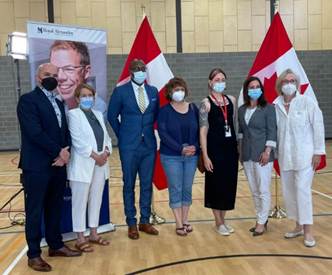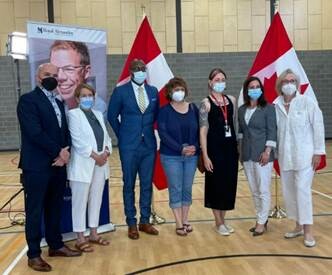Our Hospital, Our StoriesGovernment of Canada announces over $1.1 million to support people who use substances in Edmonton
Posted on: Jul 13, 2022Sharing an announcement from Health Canada about the Royal Alexandra, along with several partners, receiving $1.1 M in federal funding as part of the Substance Use and Addiction Program (SUAP) grant.

ORIGINALLY PUBLISHED HERE BY HEALTH CANADA ON 07/12/22
Government of Canada announces over $1.1 million to support people who use substances in Edmonton
Improving health outcomes for people at risk of substance-related harms and overdose
EDMONTON, AB, July 12, 2022 /CNW/ - The overdose crisis continues to take a tragic toll on families, loved ones, and communities across Canada, and remains one of the most serious public health crises in Canada's recent history. This crisis has only worsened over the course of the COVID-19 pandemic, with evidence showing a significant rise in opioid and other substance-related deaths and serious harms. While every region of the country has been impacted, some jurisdictions have been impacted more than others, including the province of Alberta. In 2021, 1,618 people died due to opioid overdose-related deaths across Alberta. The Government of Canada is committed to ensuring that all Canadians have access to the substance use services and supports they need.
Today, the Honourable Carolyn Bennett, Minister of Mental Health and Addictions and Associate Minister of Health, along with the Honourable Randy Boissonnault, Minister of Tourism and Associate Minister of Finance, announced $1.1 million in funding through Health Canada's Substance Use and Addictions Program (SUAP) to the Royal Alexandra Hospital Foundation in Edmonton, Alberta. The Preventing Drug Poisoning in Edmonton: A neighbourhood outreach and public education/awareness campaign project will provide overdose response training and trauma support at a community level. The project will also launch a campaign that will direct people at risk of experiencing substance-related harms and overdose to resources on treatment and recovery, and overdose prevention and intervention.
Today's funding will support community-level interventions to reduce the stigma associated with substance use, facilitate access to treatment and recovery, and encourage the use of harm reduction supplies. It will provide support to those disproportionately affected by substance use issues or who face barriers accessing services, including women, youth, young and middle-aged men, Indigenous Peoples, people experiencing chronic pain, 2SLGBTQIA+ individuals, and people at increased risk of substance-related overdoses.
The Government of Canada recognizes that more needs to be done to support people who use substances, and is committed to building on its efforts to respond to this crisis. We will continue to work with all orders of government, partners, Indigenous communities, stakeholders, people with lived and living experience, and organizations in Alberta and across the country to end this national public health crisis and ensure all people who use substances have access to life-saving health services and supports.
"Last year in Alberta, the opioid overdose crisis claimed 1,618 lives. This tragic loss of life is taking a heavy toll on friends, families, and communities in Alberta and across the country. Today's investment will help people who use substances in Edmonton receive the culturally safe and trauma-informed health services and supports they need. I thank the Royal Alexandra Foundation for their steadfast dedication to making a difference in the lives of Edmontonians by meeting people who use substances where they are at. Together, we will save lives, decrease the stigma surrounding substance use, and end this national public health crisis."
The Honourable Carolyn Bennett
Minister of Mental Health and Addictions and Associate Minister of Health
"The overdose epidemic is taking far too many lives; disproportionally affecting the most vulnerable in our communities. It is impacting real people, their families, and their loved ones. We are stepping up to deliver improved access to overdose response training, treatment & recovery, and harm reduction. This will get treatment faster to those who need it, address community-level needs, and save lives."
The Honourable Randy Boissonnault
Minister of Tourism and Associate Minister of Finance
"It is thoroughly understood that the opioid epidemic is one of the most pressing issues in Edmonton. While all hospitals are impacted, the Royal Alexandra Hospital is on the frontline of this immense challenge. Health officials tell us there are record-breaking numbers of hospital visits and accidental fatalities directly linked to the use of opioids since the onset of the COVID-19 pandemic – and stigma is a contributing factor in the fatalities. It is our hope that this new campaign will serve to reduce the stigma around substance use by increasing conversation around this topic and, ultimately, save lives. On behalf of our hospital and its many partners, we thank Health Canada for supporting this collective effort with this significant grant, and applaud its action and commitment to finding solutions."
Sharlene Rutherford
President and CEO, Royal Alexandra Hospital Foundation
"Edmonton is in the midst of a drug poisoning crisis that is claiming the lives of so many of our neighbours. Many of these folks are unhoused and vulnerable, and they have complex needs that require trauma-informed support and funding. I am very appreciative of the federal government's continued interest in addressing the root causes of addictions. I know that the funding being allocated to the Royal Alexandra Hospital Foundation will go a long way in increasing awareness, reducing barriers for folks who need access to these services and promoting recovery in an inclusive way."
Amarjeet Sohi
Edmonton City Mayor
- The latest national data show that the number of opioid-related deaths remain high and have continued to climb throughout 2021.
- In 2021 in Alberta an average of 4 people per day died from an opioid-related overdose and an average of 3 people per day where hospitalized from an opioid-related overdose.
- Budget 2022 committed $100 million over three years to support harm reduction, treatment, and prevention at the community level.
- This builds on $116 million provided in Budget 2021 and $66 million in the 2020 Fall Economic Statement for the Substance Use and Addictions Program.
- The Government of Canada continues to work closely with partners to provide a compassionate and evidence-based response to the crisis.
- Since 2017, the Government has dedicated more than $800 million to address the overdose crisis.
- The projects announced today are funded through Health Canada's Substance Use and Addictions Program. Through SUAP, the Government of Canada provides grants and contributions funding to other levels of government, as well as community-led and not-for-profit organizations, to respond to current drug and substance use issues in Canada. Since 2017, it has supported over 200 projects across the country. This investment includes over $64 million invested on safer supply.
- Addiction is not a choice, it is a treatable medical condition, yet many people affected by addiction face stigma. Stigma is negative attitudes, beliefs or behaviors about or towards a group of people because of their situation in life. It includes discrimination, prejudice, judgment and stereotypes, which can isolate people who use drugs. The language we use has a direct and deep impact on people around us. All Canadians, including media and health professionals, can reduce stigma by changing the words they use related to substance use and people who uses drugs.
- Opioid and stimulant related harms in Canada
- Federal actions on opioids to date
- Get Help with Substance Use
- Wellness Together Canada
- Substance Use and Addictions Program
SOURCE Health Canada

Contacts
Maja Štaka
Office of the Honourable Carolyn Bennett
Minister of Mental Health and Addictions and Associate Minister of Health
343-552-5568
Media Relations
Health Canada
613-957-2983
media@hc-sc.gc.ca
Public Inquiries:
613-957-2991
1-866-225-0709
